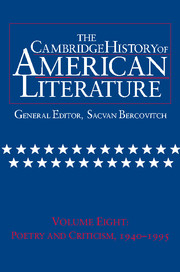Book contents
- Frontmatter
- Introduction
- Poetry, Politics, and Intellectuals
- Criticism since 1940
- Introduction
- 1 Politics and American Criticism
- 2 The Emergence of Academic Criticism
- 3 The Nationalizing of the New Criticism
- 4 The Canon, the Academy, and Gender
- 5 Deconstruction and Poststructuralism
- 6 From Textuality to Materiality
- 7 Cultural and Historical Studies
- Conclusion: Academic Criticism and its Discontents
- Appendix II: Biographies of Critics
- Chronology 1940–1995
- Bibliography
- Index
3 - The Nationalizing of the New Criticism
from Criticism since 1940
Published online by Cambridge University Press: 28 March 2008
- Frontmatter
- Introduction
- Poetry, Politics, and Intellectuals
- Criticism since 1940
- Introduction
- 1 Politics and American Criticism
- 2 The Emergence of Academic Criticism
- 3 The Nationalizing of the New Criticism
- 4 The Canon, the Academy, and Gender
- 5 Deconstruction and Poststructuralism
- 6 From Textuality to Materiality
- 7 Cultural and Historical Studies
- Conclusion: Academic Criticism and its Discontents
- Appendix II: Biographies of Critics
- Chronology 1940–1995
- Bibliography
- Index
Summary
The project of textual interpretation that distinguished the new postwar academic criticism contained a potentially explosive contradiction. On the one hand, by challenging the anti-interpretive bias of academic scholars and literary journalists, the new academic critics exposed the breakdown of a genteel consensus about the nature and cultural function of literature. Their assertion that literature required interpretation implicitly opened literary study to conflicts that had previously been unspoken or papered over. On the other hand, the school of the new academic criticism that became the most influential – and which, accordingly, came to be labelled “the New Criticism” – emphasized the separation of literature from political and moral judgments. With its insistence that the literary text be read as “a structure in its own right,” whose explication required a systematic “ontological” criticism, the New Criticism circumscribed the allowable forms of critical conflict, thereby containing the most radical implications of its own insistence on interpretation.
In several respects, however, the New Critics’ radical emphasis on interpretation and their conservative exclusion of “extraliterary” arguments from the arena of professional critical debate were entirely compatible. Both tendencies enabled literary studies to establish itself as an accredited discipline in the postwar university. The New Critical theory of literature as an autonomous, self-contained form of discourse and the New Critical method of close textual analysis gave academic literary study a distinctive domain, separate from the supposedly extraliterary disciplines of sociology, psychology, history, and philosophy. And both New Critical theory and method were ideally suited to the task of teaching a vastly expanded and demographically more diverse population of college students.
- Type
- Chapter
- Information
- The Cambridge History of American Literature , pp. 305 - 323Publisher: Cambridge University PressPrint publication year: 1996



